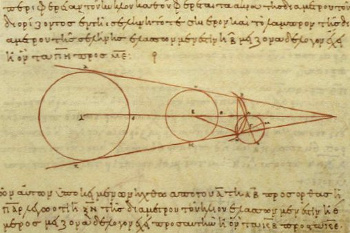Metaphysics
November 12, 2018
English has appropriated many
words from other
languages. The term,
science, comes from the
Latin word,
scientia, meaning
knowledge, and many scientific terms derive from Latin and
Greek words. From Greek we have such things as
electron, derived from the Greek word for
amber (elektron, ηλεκτρον). The electron was named for amber because of amber's propensity for developing an
electrostatic charge when rubbed. I wrote about amber and
triboelectricity in a
previous article (Triboelectric Generators, February 8, 2016).
Ortho-,
meta-, and
para-, are three Greek
prefixes that are well known to
organic chemists, since they are used in the naming of
arene substitution patterns in
aromatic hydrocarbon molecules (see figure). The prefix,
ortho-, comes from the Greek
adjective,
orthos (
,ορθος), meaning
straight,
true,
correct,
regular."[1] The prefix,
meta-, comes from the Greek
preposition,
meta (μετα), meaning among other things,
after,
next after, and
behind,[2] while the prefix,
para-, from the Greek preposition,
para (παρα), means
against and
contrary to.[3] You can see how the
chemical prefixes relate to these words.

arene substitution patterns, ortho-, meta-, and para- on a benzene ring. These prefixes derive from Greek words for regular, next after, and contrary to. (Created using Inkscape)
The meta- that most
physicists and
engineers know is the different sense of the prefix as used to define such things as
metamaterials. The meaning of meta- in that case is
beyond or
transcending. This definition also applied to the "meta" in
metaphysics, the branch of
philosophy that looks at issues beyond physics, such as prime causes and purposes, including the
essence and
qualities of things. Metaphysics tries to understand
existence and its qualities of
cause and effect,
space and time,
change and
possibility. Some important subfields of metaphysics are as follow:
Ontology. Ontology concerns itself with the nature of existence and reality, such as what entities exist, or may exist, their differences and similarities, and their relationship to each other.
Teleology. Teleology attempts to explain why something exists; that is, what its purpose might be. The word derives from telos (purpose) and logos (explanation). What's most interesting about teleology is that it considers that things might have an intrinsic purpose that does not depend on what humans might think. A simple example of this is the idea that the purpose of a seed is to make its plant, but scientists might argue that discussing the purpose of seeds is not useful. A seed is just a component in a biological process. Things just follow the laws of nature, but that brings up the question of why those laws exist.
Philosophical Cosmology. Philosophical cosmology, as distinct from physical cosmology, is the study of the conceptual foundation of the universe. It includes the question that's always bothered me, the ultimate existential question of why anything should exist, as well as the companion question of whether the universe has a purpose. It also considers man's place in the universe. This includes the interesting idea that the universe might be designed to evolve in a particular, fixed path, so that free will is just an illusion.

Cosmological models through the ages. Left, the Earth, carried by elephants on a giant turtle, a Hindu model of the universe. Middle, Atlas holding the Earth on his shoulders. Right, A medieval pilgrim crossing the sphere of the fixed stars. (Left image, an illustration from Popular Science Monthly, volume 10, 1876, via Wikimedia Commons. Middle image, a Mosaic in a subway station, Detail of a photo by K.A. Stepanov, via Wikimedia Commons. Right, a wood engraving from Camille Flammarion's L'Atmosphere: Météorologie Populaire (Paris, 1888), p. 163, via Wikimedia Commons.)
While
physics endeavors to explain the universe by devising laws that have a capacity for prediction (although the idea of
quantum uncertainty makes these predictions less certain than the
clockwork universe of
classical physics), metaphysics offers a different type of explanation. Instead of "how," it asks "why?" Since humans are supposedly smarter than a bag of
rocks (except, however, when the rocks are
computer chips), it should be possible for us to get some understanding of what everything is about by thinking about things. That determination to attain
truth through
logical reasoning has persisted since the time of
Aristotle (384 BC-322 BC).
Metaphysical ideas have influenced science in many ways. Questioning the centrality of humans in the universe led to the
Copernican Revolution.
Einstein and others were so opposed to the idea that
nature was not
deterministic that they sought an alternative
hidden-variable theory that would complete
quantum mechanics. Einstein famously said that "
God does not play dice," and he was especially troubled by the "
spooky action at a distance" of
quantum entanglement. As Einstein wrote in a March 3, 1947, letter to
Max Born,
"I am quite convinced that someone will eventually come up with a theory whose objects, connected by laws, are not probabilities but considered facts, as used to be taken for granted until quite recently."[4]
Karl Svozil of the
Institute for Theoretical Physics of the
Vienna University of Technology (Vienna, Austria) has recently published a paper on
arXiv that summarizes the metaphysics behind some current problems in science.[5] These include the idea that we might be living in a
computer simulation, the possibility that
computing machines may become
conscious and have an
intelligence that's superior to humans, and the possibility of
extraterrestrial life and intelligence. There is also the
enigma of existence, which I mentioned earlier, and it appears that science is not capable of answering the ultimate existential question.
As Svozil writes, science has
traumatized humanity in various
humiliations, such as demoting the Earth from the center of the universe; and, through
Darwinian evolution, showing that man is just another member of the continuum of plants and
animals. However, science has more than compensated by enhancement of
individual dignity and liberating us from multiple
fears. Still, Svozil writes, "... I shall mention a few humiliations which are yet to come, and can be expected during our pursuit further down the scientific lane."[5]

While Copernicus gets all the credit for heliocentrism, Aristarchus of Samos (310 BC - c. 230 BC) was the first to have proposed a heliocentric system. Aristarchus went as far as to estimate the distance of the Earth to the Sun as 10,000 Earth radii. This is about half its actual value.
(From a 10th century copy of Aristarchus of Samos's 2nd century BC calculations of the relative sizes of the Sun, Moon and the Earth, via Wikimedia Commons)
One of these humiliations is the idea that we might be living in a
virtual reality, a
computer simulation of the universe, or our local part of it. Our consciousness is just part of a computer running in a higher realm. To
add insult to injury, this computer simulation might have been created for a trivial purpose, such as
marketing.[5] The first explication of this idea is contained in a 2003 paper by
Nick Bostrom, a
professor of
philosophy at the
University of Oxford (Oxford, UK).[6]
The central tenet of this
theory is that computing power will increase enormously in the future, and this would allow a simulation of conscious beings. The argument is made that if this scenario is possible, then many such simulations would be run simultaneously, and it's more likely than not that we are in one such simulation. Other possibilities are that advanced
civilizations of the sort that could run such simulations are not possible, or such civilizations would have no interest in simulating a primitive culture such as our own.[7] A
corollary principle is that our
descendants will almost certainly never run such a simulation unless we are objects in a simulation.[7]
The idea that machines might appear to be as intelligent as humans has existed since the time of
Alan Turing (1912-1954) when computers were just a collection of
relays and whirring
motors. Turing's
eponymous Turing test is a test of whether a machine appears to be human. Imitation is one thing, but can computers achieve consciousness? As Turing later wrote, "Once the machine thinking method had started, it would not take long to outstrip our feeble powers."[8] What will happen at the crossover between humans and computers being the most intelligent and conscious species on Earth? We might try to use these computing resources while preventing machine consciousness, but that probably isn't possible.
Ever since
Enrico Fermi posed the question, "
Where is everybody?," we've been wondering why no intelligence has been detected beyond Earth. Making contact with an advanced civilization would indeed be humbling, but being alone in the universe would cause some serious soul-searching. As Svozil writes, we may not be alone, but we've been isolated from a
galactic hypercivilization since interaction would be a
lose-lose situation.[5]
Contamination of
human culture by an advanced civilization would cause widespread dissolution of
human values and
beliefs, while the advanced civilization would suffer from a
backflow of individuals from Earth to the advanced population centers which would have negative consequences for the advanced civilization.[5]

Science fiction has always examined metaphysical ideas.
It's quite likely that when we're visited by extraterrestrials, these would be intelligent machines and not biological creatures. It appears that even humans are on track to develop conscious machines before interstellar travel.
(Cover of the Fall 1953 issue (September 1, 1953) of Tops in Science Fiction by Frank Kelly Freas (1922-2005), via Wikimedia Commons
In the past, lives were "full of
wonders,
mysticism and
miracles," but those times have passed since scientific explanations are now preferred.[5] Now, when we don't discern a cause for some
phenomenon we tend to assume that a cause exists but science hasn't gotten around to finding it. Metaphysics will still motivate scientists to explore certain areas rather than others, as the recent surge in
observational astronomy and
string theory research has shown.
References:
- "ortho-," Definition at the Online Etymology Dictionary.
- "meta-," Definition at the Online Etymology Dictionary.
- "para-," Definition at the Online Etymology Dictionary.
- Max Born, The Born - Einstein Letters, Correspondence between Max & Hedwig Born and Albert Einstein 1916/1955, Irene Born, Trans., The Born Einstein Letters, Macmillan. 1971. p. 158.
- Karl Svozil, "Theology and Metaphysics in Sombre, Scientific Times," arXiv, September 14, 2018.
- Nick Bostrom, "Are You Living in a Computer Simulation?," Philosophical Quarterly, vol. 53, no. 211 (2003), pp. 243‐255 (PDF File).
- Simulation Argument Website.
- A. M. Turing, "Intelligent Machinery, A Heretical Theory," Philosophia Mathematica, vol. 4, no. 3, (September 1, 1996, Posthumous Publication), pp. 256–260, https://doi.org/10.1093/philmat/4.3.256.
Linked Keywords: English language; word; language; science; Latin; knowledge; Greek language; electron; amber; electric charge; electrostatic charge; triboelectric effect; triboelectricity; prefix; organic chemistry; organic chemist; arene substitution patterns; aromatic hydrocarbon; molecule; adjective; preposition; chemistry; chemical; benzene; cyclic compound; ring; Inkscape; physicist; engineer; metamaterial; metaphysics; philosophy; essence; quality (philosophy); existence; causality; cause and effect; spacetime; space and time; change (philosophy); potentiality and actuality; possibility; Ontology; Teleology; intrinsic; purpose; human; idea; seed; plant; scientist; biological process; physical law; laws of nature; Philosophical Cosmology; physical cosmology; universe; materialism; ultimate existential question; free will; illusion; cosmology; cosmological; conceptual model; Earth; elephant; turtle; Hindu; Atlas (mythology); Middle Ages; medieval; pilgrim; celestial sphere; fixed stars; Popular Science Monthly; Wikimedia Commons; mosaic; subway station; wood engraving; Camille Flammarion; physics; uncertainty principle; quantum uncertainty; clockwork universe; classical physics; rock; integrated circuit; computer chip; truth; logic; logical reasoning; Aristotle (384 BC-322 BC); Copernican Revolution; Albert Einstein; nature; determinism; deterministic; hidden-variable theory; quantum mechanics; God does not play dice; EPR paradox; spooky action at a distance; quantum entanglement; Max Born; probability theory; probability; Karl Svozil; Institute for Theoretical Physics; Vienna University of Technology (Vienna, Austria); arXiv; computer simulation; computer; computing machine; consciousness; conscious; intelligence; extraterrestrial life; enigma; psychological trauma; traumatize; humiliation; Darwinian evolution; animal; individual dignity; fear; Nicolaus Copernicus; heliocentrism; Aristarchus of Samos; estimate; distance of the Earth to the Sun; Earth radius; virtual reality; simulation hypothesis; computer simulation of the universe; add insult to injury; marketing; Nick Bostrom; professor; philosophy; University of Oxford (Oxford, UK); theory; civilization; corollary principle; descendant; Alan Turing (1912-1954); relay; electric motor; eponymous; Turing test; Enrico Fermi; Fermi paradox; Where is everybody?; galactic empire; galactic hypercivilization; no-win situation; lose-lose situation; contamination; human culture; value (ethics); human values; belief; backflow; science fiction; extraterrestrial life; extraterrestrials; artificial intelligence; intelligent machines; biological creature; interstellar travel; Frank Kelly Freas (1922-2005); wonder (emotion); mysticism; miracle; phenomenon; observational astronomy; string theory research; ortho-; meta-; para-.